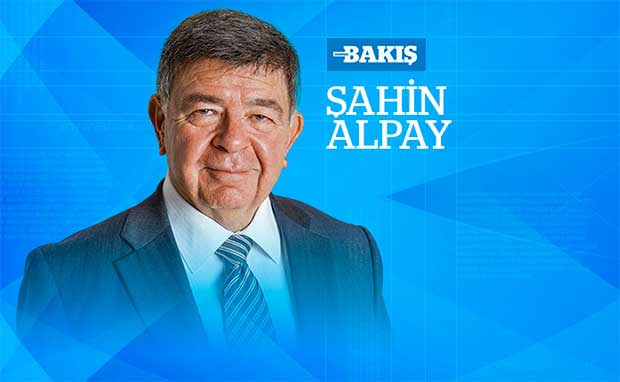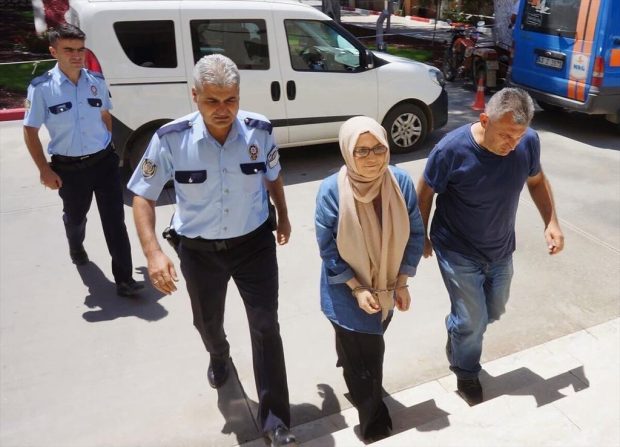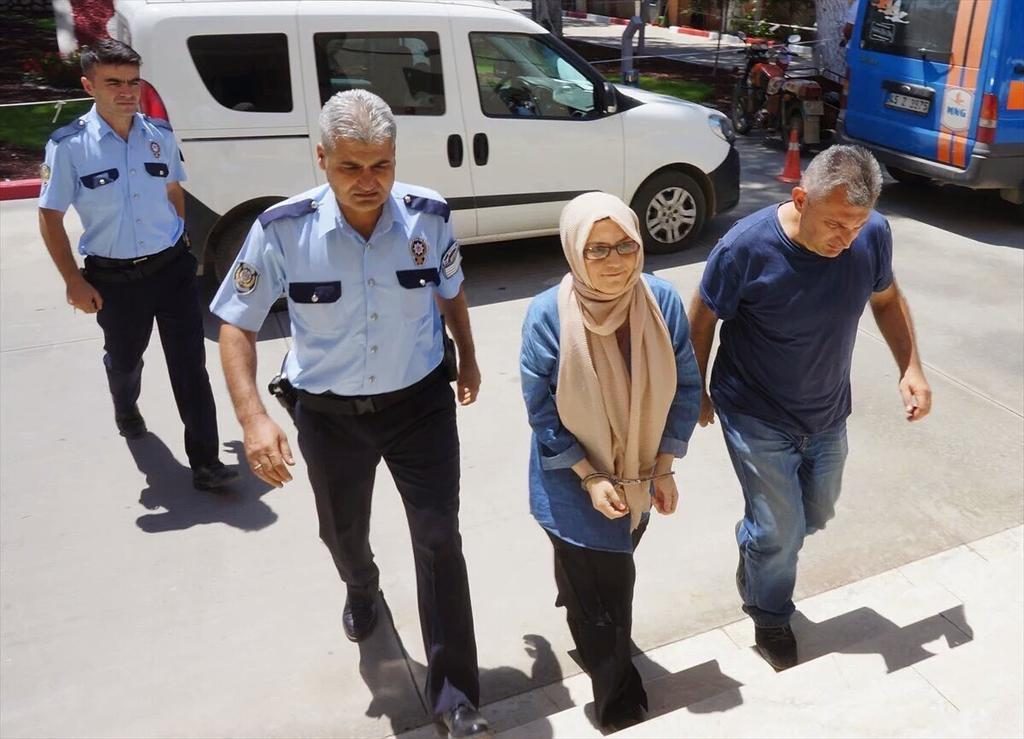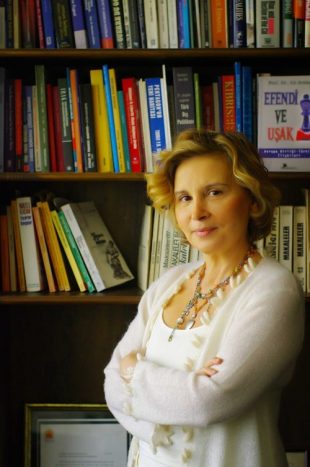28 Jul 2016 | Europe and Central Asia, News, Turkey, Turkey Uncensored

Şahin Alpay is a columnist for multiple newspapers, including Yarina Bakis, which was forced to suspend its print edition after the coup.
It was 6am when Professor Şahin Alpay and his wife heard the knock at the door. It was the police. They had come to take him into custody.
The 72-year-old journalist’s flat was searched for two hours. As he was led away, Alpay said: “I do not know why I am being taken away. I am not in a position to say anything.”
Alpay was only one of 47 journalists who were subject to arrest under warrants issued on Wednesday. The list included the names of columnists, editors and reporters who formerly had been employed in Zaman daily, which was seized by the security forces last March. It and its journalists now stand accused of being the so-called media leg of Fethullah Gülen terror organisation.
Alpay has been one of the most consistent and powerful socially liberal voices in Turkey for decades. He is very well known in European political circles, particularly in Sweden where he had completed his doctorate. He is respected within Germany’s social democratic, liberal and green movements. For years, he had been part of democracy projects conducted by the Ebert and Naumann foundations. Until very recently he had taught political science at Bahçeşehir University and continued to write columns in multiple newspapers.
The list also includes names such as Hilmi Yavuz, an 80-year-old poet, philosopher and literary critic, who is also well known abroad. Other names on the list wereP rofessor İhsan Dağı, a brilliant liberal scholar, and theologue Ali Bulaç.
Then there are journalists: Lale Kemal, an outstanding analyst of defence issues for Jane’s Defence Weekly; Nuriye Akman, who is well known for her long interviews; Bülent Keneş, former editor-in-chief of Today’s Zaman, which is now controlled by trustees appointed by the government. The list goes on and on.
On Monday, a list of arrest warrants issued against 42 journalists. On Wednesday there were 47 more names. With this second wave of arrests, there seems no doubt that the clampdown on critical and independent journalism will continue in stages. The first wave targeted reporters regardless of the publications they were affiliated with. The second wave was aimed at Zaman. The message shared on social media: there is more to come.
Turkey’s situation cannot be any more serious. The aftermath of the completely unacceptable and bloody coup is marked by an incomprehensible priority to target dissenting intellectuals. This is reminiscent of the pattern the generals set down after the military coup in 1980. The targets were communists then, now it’s Gülenists that are the subject of the massive witch hunt.
The accusation directed at Nazlı Ilıcak, a 71-year-old veteran journalist on the centre right-liberal flank, is rather telling. The lawyers say that she is to be charged with “establishing the media leg of FETO terror organisation”, meaning a lifetime imprisonment if the charge sticks.
This was the overall picture as of the past 24 hours. It is, then, completely appropriate that, now that the witch hunt is openly targeting liberals on the right and left in Turkey, the rules of the emergency rule paves the way for a counter-putsch or, as the veteran journalist, Hasan Cemal, a close friend of Alpay and Ilıcak, labelled as “civilian coup”.
Indeed, Wednesday morning Human Rights Watch was swift in issuing an SOS warning to the world about the emergency rule, which now allows the authorities to keep people in custody up to 30 days.
“It is an unvarnished move for an arbitrary, mass, and permanent purge of the civil service, prosecutors, and judges, and to close down private institutions and associations without evidence, justification, or due process,” HRW said.
“The wording of the decree is vague and open-ended, permitting the firing of any public official conveniently alleged to be ‘in contact’ with members of ‘terrorist organizations’, but with no need for an investigation to offer any evidence in support of it,” Emma Sinclair-Webb said. “The decree can be used to target any opponent – perceived or real – beyond those in the Gülen movement.”
This is the list of 47 journalists targeted for arrest:
Osman Nuri Öztürk, Ali Akbulut, Bülent Keneş, Mehmet Kamış, Hüseyin Döğme, Süleyman Sargın, Veysel Ayhan, Şeref Yılmaz, Mehmet Akif Afşar, Ahmet Metin Sekizkardeş, Alaattin Güner, Faruk Kardıç, Metin Tamer Gökçeoğlu, Faruk Akkan, Mümtaz’er Türköne, Şahin Alpay, Sevgi Akarçeşme, Ali Ünal, Mustafa Ünal, Zeki Önal, Hilmi Yavuz, Ahmet Turan Alkan, Lalezar Sarıibrahimoğlu (Lale Kemal), Ali Bulaç, Bülent Korucu, İhsan Duran Dağı, Nuriye Ural (Akman), Hamit Çiçek, Adil Gülçek, Hamit Bilici, Şenol Kahraman, Melih Kılıç, Nevzat Güner, Mehmet Özdemir, Fevzi Yazıcı, Sedat Yetişkin, Oktay Vızvız, Abdullah Katırcıoğlu, Behçet Akyar, Murat Avcıoğlu, Yüksel Durgut, Zafer Özsoy, Cuma Kaya, Hakan Taşdelen, Osman Nuri Arslan, Ömer Karakaş.
A version of this article was originally posted to Suddeutsche Zeitung. It is published here with permission of the author.

Turkey Uncensored is an Index on Censorship project to publish a series of articles from censored Turkish writers, artists and translators.
28 Jul 2016 | mobile, News, Turkey

Büşra Erdal, one of 89 journalists subject to arrest, surrendered in Manisa and was taken to police headquarters in handcuffs.
Media freedom must be treated for what it really is: a strong test of democracy. And any response to a crisis requires a cautious approach if basic civil liberties, the building blocks of any free society, are to be protected. Make no mistake about it, in the case of Turkey, we are faced with a situation where authorities are violating the basic human right of Turkish citizens to engage in free media.
Just consider the following media freedom issues that have taken place after the attempted coup in Turkey on 15 July.
- The authorities have ordered the closure of 45 newspapers, 15 magazines, 16 television channels, 23 radio stations, 3 news agencies, and 29 publishers;
- Arrest warrants have been issued against 89 journalists, accusing them of supporting terrorism; seven of them have already been detained;
- 370 journalists at the state broadcaster TRT have been suspended;
- Press accreditations for 34 journalists from eight other Turkish media outlets have been revoked;
- 60 staff members with Cihan News Agency have been fired;
- The Radio and Television Supreme Council of Turkey (RTÜK) has cancelled the licenses of more than 20 radio and television stations;
- The Telecommunications Authority (TIB) has blocked more than 20 news websites.
These issues must also be put in the context of the general, sharply deteriorating media freedom situation in Turkey in the past few years. An anti-terror law in Turkey, in effect since 1991, is being used to round up terrorists but also many others, including those who it is my job to lobby for – journalists and media.
Today there are dozens of journalists in jail in Turkey, prosecuted and convicted mostly under a law designed to fight terrorism and protect people. The number of journalists jailed in Turkey is without precedent in the OSCE region. Under the anti-terror law, merely reporting on controversial topics could land a journalist in court.
The latest case in a string of the recent crackdown activities on media in Turkey is the detention of seven journalists in the last two days, while arrest warrants were issued against several dozens more, accusing them of supporting terrorism. To say that dissenting voices, although still present and persisting, are under duress in Turkey is a severe understatement.
The authorities’ systematic abuse of media and its players, done with the intention of guaranteeing control of the media landscape, is nothing short of a clear and present threat to democracy in the country.
Media-freedom advocates like myself, must and will continue to raise our voices and provide the defenses necessary for free expression and free media to flourish in Turkey.
I will raise the issue of the rights of media and of journalists before national legislatures. I will engage in public awareness campaigns on behalf of free media. I will continue to do everything in my power to protect and safeguard the independent and pluralistic voices that are the cornerstones of any society. And I will call on elected officials to spend the resources, including political capital, essential to build environments conducive to free expression.
I believe that a society that respects human rights is working towards the common good of its people and that limiting and breaching fundamental democratic and civil liberties negatively affects the common good. I also believe that the role of elected officials is to write good laws and appoint good law enforcement authorities, including police, prosecutors and judges to interpret those laws in a manner that will make free expression possible.
All democratically elected governments must adhere to the underlying rules of their society – free markets, universal suffrage, access to government information and other basic civil liberties, including a free and pluralistic media environment.
Freedom of expression is a universal and basic human right; it does not stop at views deemed appropriate by the authorities. It remains the role of journalists to inform people of public issues, including highly sensitive issues. And it remains the role of the authorities to ensure that journalists, no matter how critical or provocative, can do so freely and safely. Turkey fails on this account.
More commentary from Dunja Mijatović
Why quality public service media has not caught on in transition societies
Chronicling infringements on internet freedom is a necessary task
Propaganda is ugly scar on face of modern journalism
More about Turkey
Yavuz Baydar: Erdogan is ruling Turkey by decree
Can Dündar: Turkey is “the biggest prison for journalists in the world”
Turkey’s film festivals face a narrowing space for expression
27 Jul 2016 | Europe and Central Asia, Mapping Media Freedom, mobile, News, Turkey, Turkey Uncensored

Büşra Erdal, who surrendered in Manisa, taken to police headquarters in handcuffs.
“It was very, very close,” according to a source who followed the case of columnist and human rights lawyer Orhan Kemal Cengiz. By a hair he had avoided detention. While Cengiz has now been released, he is unable to travel abroad.
During the interrogation, Cengiz had repeatedly been asked about critical tweets he had posted about a year ago. “Those who led the interrogation were utterly hostile, seemingly set for finding a pretext to hold him in custody,” my source said. Cengiz’s friends believe that his impeccable international reputation and his work for the European Court of Human Rights, where he has defended Kurds and even, in a couple of cases, Turkish Islamists against the state, may have saved him from a jail cell.
However, there is nothing to suggest the easing this post-coup witch hunt. Yesterday, the veteran journalist Nazlı Ilıcak was arrested at a police checkpoint in Bodrum and taken into custody. Judicial affairs journalist Büşra Erdal surrendered after she tweeted that she was being punished for her work. Sadly the powerful Doğan Media Group outlets, of which both honourable journalists are affiliated, remained silent. Not a word of support was seen in any of the group’s newspapers.
The only support came from the Enis Berberoğlu, former chief editor at Hürriyet and now MP and deputy of the main opposition Republican People’s Party (CHP), who tweeted: “As their superior once, I was mainly responsible for the stories and the sections that Bülent Mumay and Arda Akın wrote and worked for. I vouch and stand for them.”
Against the backdrop of the authorities’ search for 42 journalists, pro-government media was busy on Tuesday inciting hatred for the columnists and asking for their imprisonment, including the daily Akşam. The pro-Justice and Development Party (AKP) daily Sabah added to the flames by accusing columnists such as Hasan Cemal, Kadri Gürsel, Cengiz Çandar, Perihan Mağden, Mehmet Altan and others of provoking the coup. These journalists and columnists are no longer allowed to express themselves in any media outlet.
Perhaps more than anything else, it was a crucial legal appointment that worried Turkey’s dissident figures in media and academia. In a hasty move, the government named İrfan Fidan as the chief prosecutor for Istanbul. Until Monday, Fidan was a deputy attorney in Istanbul’s Anti-Terror and Organised Crime Unit. What’s most notable, however, is that Fidan was the prosecutor who sentenced Cumhuriyet editors Erdem Gül and Can Dündar to five years and five years and ten months, respectively, in prison. The pair had covered the alleged supply of arms to Syrian jihadist groups by the Turkish secret service.
Academic Esra Mungan and three others who had signed the peace petition for the Kurds clashed were also detained due to his efforts. In another example, Fidan had taken over the case that implicated high-ranking AKP ministers and president Recep Tayyip Erdogan’s family members in corruption. He dismissed all charges.
Many fear, therefore, that his appointment to such a powerful post may come to mean a steep escalation against journalists and scholars in the coming weeks.
All other signs, too, indicate harder times.
On Monday night, in the midst of turmoil, Erdogan ratified the law which, in practice, subordinates the high judiciary to the political executive and immediately after the Board of Judges and Prosecutors, led by the Justice Ministry, implemented a long series of appointments and removals in the Court of Cassation and Council of State.
Erdogan met with two opposition party leaders. CHP and Nationalist Movement Party leaders were invited, but not the third largest elected one, the pro-Kurdish Peoples’ Democratic Party. It was a deliberate choice, raising eyebrows on how serious the ruling AKP is about rebuilding democracy. In addition, Erdogan spoke for a possible extension of emergency rule for an additional three months.
Meanwhile, Turkey will be run by decrees and everybody knows what that means.
A version of this article was originally posted to Suddeutsche Zeitung. It is published here with permission of the author.

Turkey Uncensored is an Index on Censorship project to publish a series of articles from censored Turkish writers, artists and translators.
25 Jul 2016 | mobile, News, Turkey, Turkey Uncensored

Nazlı Ilıcak
A “ping” woke me in early hours of Monday morning. It was a message from a colleague reading: “Signs of a crackdown. Arrest warrant for Nazlı Ilıcak is issued, she is being searched.”
This was the witch hunt that many critical journalists who belong to the shrinking independent media dreaded for days.
Ilıcak is a 72-year-old veteran journalist. A fiercely defiant figure who belongs to the centre-right and liberal flank of the media, she had just lost her column in the liberal daily, Özgür Düşünce, which was forced to close last week under immense legal and financial pressure.
I rushed out of bed to contact lawyers pursuing the cases, like the one about Orhan Kemal Cengiz, an internationally respected columnist, lawyer and human rights activist, who was conditionally released on Sunday with a ban on travelling abroad.
Soon we had been informed about a list of 42 journalists who have all been targeted with arrest orders on the basis of being part of the “media leg of terrorist organisation FETO” and by implication part of the Gülen Movement.
Reminiscent of Thomas Hobbes’s aphorism, “homo homini lupus” (“man is wolf to man”), some well-placed journalists were busy – like a certain popular columnist with Hürriyet daily – joining the chorus in support for their arrest.
The manhunt was unleashed early and at the time of writing, at least 19 of them were either seized or had surrendered. Ilıcak’s whereabouts were unknown. Eleven of the journalists on the list are believed to be abroad.
The list is a curious one. For us veteran journalists it contains a blend of good colleagues and bold reporters, who were busy breaking story after story on corruption, abuses of power and the deterioration of Turkey’s democratic order.
Büşra Erdal, who wrote for the now-closed Zaman Daily, was one of the best reporters covering the judiciary and court cases; Cihan Acar was known for relentlessly scrutinising stories in the now shuttered Bugün daily and later in Özgür Düşünce. They were long targeted as Gülen sympathisers but what mattered for journalism was their contribution to it.
Another, Bülent Mumay, was recently fired from Hürriyet. Staunchly secular, he ran the internet edition of the large daily, and it was his endless questioning of the government via Twitter that, he says, led to his unemployment. Perhaps not so surprisingly, he was quick to post a photo of his press card on Facebook, issued by Turkish Journalists’ Association (TGC), saying: “This is the only organisation I belong to. I know of no other; I know of no other profession. I shall now go the prosecutor’s office to tell this.”
Another one was Fatih Yağmur, a brilliant young reporter who was the first to break the story in March 2014 of the Turkish Secret Service lorries that allegedly carried weaponry to Syrian jihadists months before daily the Cumhuriyet, whose editor Can Dündar was sentenced to five years and ten months in prison.
Yağmur was soon after fired from Radikal daily, a part of Doğan Media Group, without any specific explanation.
The Platform for Independent Journalism (P24), of which I am a co-founder, has awarded Yağmur with the European Union Investigative Journalism Award last year. He was proud to be recognised after the humiliation of being left unemployed for doing his job properly.
Soon after the manhunt began, Fatih tweeted: “I hear that arrest order was issued on me. It was obviously not enough to punish me with unemployment. I am now shutting down my telephone etc. I shall not surrender until the Emergency Rule is over.”
We also found out that Ercan Gün, news editor of Rupert Murdoch-owned Fox TV, was on the list. His friends said he was on his way to Istanbul to surrender. Gün tweeted: “I trust the law, even if under Emergency Rule.”
With the traffic of those hunted, it was apparent that they believed a certain motive behind the arrests. Ufuk Şanlı, who had earlier worked with Zaman and after (the now a staunch pro-AKP daily) Sabah, tweeted: “I understand that the arrests were issued about journalists who covered and commented about the graft probes (about Erdoğan and the AKP top echelons) in 17-25 December. Thus, my name too.”
He added: “I’ve been a journalist for 15 years, and unemployed for 10 months. I want everybody to know that I have not been in anything but journalism all this time. I believe in democracy, and please pay attention to anything else [said].”
Indeed, the curious mix about the list is telling: instead of a core of columnists, keen reporters, which is the backbone of journalism, stand out. So, informing part of our profession is automatically dealt another severe blow.
This is now the time to raise the SOS flag to all our good colleagues in democratic countries. Unless given clearly articulated assurances about media freedom, the ongoing crackdown will remain a fact. The entire journalist community and international organisations should be acting with a maximum focus on the developments.
All the independent journalists of Turkey who fear the worst, I’m afraid, are justified to do so.
The 42 journalists targetted with arrest orders are: Abdullah Abdulkadiroğlu, Abdullah Kılıç, Ahmet Dönmez, Ali Akkuş, Arda Akın, Nazlı Ilıcak, Bayram Kaya, Bilal Şahin, Bülent Ceyhan, Bülent Mumay, Bünyamin Köseli, Cemal Azmi Kalyoncu, Cevheri Güven, Cihan Acar, Cuma Ulus, Emre Soncan, Ercan Gün, Erkan Akkuş, Ertuğrul Erbaş, Fatih Akalan, Fatih Yağmur, Habib Güler, Hanım Büşra Erdal, Haşim Söylemez, Hüseyin Aydın, İbrahim Balta, Kamil Maman, Kerim Gün, Levent Kenes, Mahmut Hazar, Mehmet Gündem, Metin Yıkar, Muhammet Fatih Uğur, Mustafa Erkan Acar, Mürsel Genç, Selahattin Sevi, Seyit Kılıç, Turan Görüryılmaz, Ufuk Şanlı, Ufuk Emin Köroğlu, Yakup Sağlam, Yakup Çetin.
But it was not just the press that have reason to fear the aftermath of the coup.
The number of arrests nationawide has approached 15,000 while 70,000 people have been purged within the state apparatus and academia. According to Erdogan’s statement late Saturday night, out of 125 generals arrested, 119 have been detained. The number of lower ranked officers and soldiers rounded up stands at 8,363.
Out of the 2,101 judges and prosecutors arrested, 1,559 are in detention as well as 1,485 police officers and 52 top local governors. Fifteen universities, 35 hospitals, 104 foundations, 1,125 NGOs and 19 trade unions have been shut down, based on the allegations that they all belong to a “parallel structure”, namely the Gülen Movement.
The largest union of judges and prosecutors, YARSAV, whose inclination is left and secular, has been shut down indefinitely. The country’s largest charity group, Kimse Yok Mu, which has a vast network of hospitals and orphanages across Africa and Asia, has also been closed.
All this official data speaks for itself, exposing the magnitude of the “counter wave”.
It raises huge questions for any decent journalist. We would be led to believe that Turkey’s arrested generals – a third of the country’s 347 – are Gülenists. But this doesn’t look at all convincing among political circles in the US capital, according to Hürriyet’s Washington correspondent Tolga Tanış.
What’s perhaps more worrisome is that given the coup attempt, the arrests and the incredible implosion, Turkey’s defence system is in huge crisis, leaving the country very vulnerable to hostile activity, in particular by IS units.
Then, of course, there is the widespread confusion over key institutions such as schools and hospitals being shut down. There is no clarity about the fate of the students and patients.
The emergency rule has sent chills deep into the intellectual and traditionally dissenting elite of Turkey. So far, there has been absolutely no assurance from Erdogan or prime minister Binali Yıldırım that the freedom and rights of those in the media, academia, civil society organisations and political opposition groups will be respected.
On the contrary, an arrest order was issued for 19 local journalists in Ankara. A young reporter with ETHA news agency, Ezgi Özer, was arrested in Dersim province. The rector of Dicle University in Diyarbakır, Ayşegül Jale Saraç was detained as well.
Not so surprisingly, then, there is a widespread mistrust and fear spreading now into the intellectual community in Turkey about what they see as an indiscriminate crackdown.
As my colleague Can Dündar put it in the Guardian on Friday: “‘Fine, we are rid of a military coup, but who is to shelter us from a police state? Fine, we sent the military back to their barracks, but how are we to save a politics lodged in the mosques?”
“And the question goes to a Europe preoccupied with its own troubles: will you turn a blind eye yet again and co-operate because ‘Erdogan holds the keys to the refugees’? Or will you be ashamed of the outcome of your support, and stand with modern Turkey?” Dündar added.
I agree with him and let me add a key point: if this oppressive trend continues with full force members of the media, academia, and civil society, as well as the young and secular who feel victimised and desperate due to the vicious cultural struggle that has been going on for years, will have no choice but emigrate. Europe and the West should brace themselves for this scenario.
Turkey is cracking under its incurable divisions.
A version of this article was originally posted to Suddeutsche Zeitung. It is published here with permission of the author.

Turkey Uncensored is an Index on Censorship project to publish a series of articles from censored Turkish writers, artists and translators.





